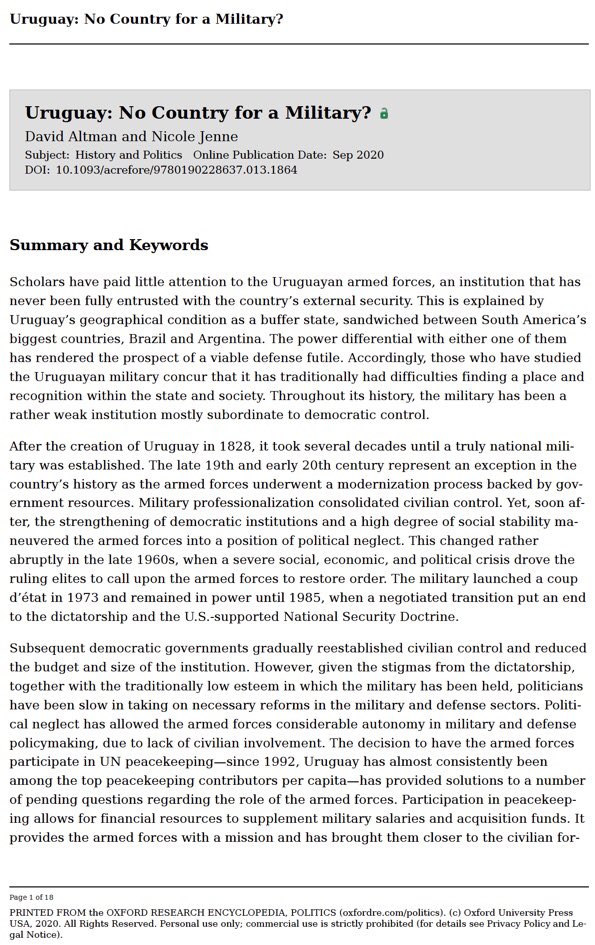 Scholars have paid little attention to the Uruguayan armed forces, an institution that has never been fully entrusted with the country’s external security. This is explained by Uruguay’s geographical condition as a buffer state, sandwiched between South America’s biggest countries, Brazil and Argentina. The power differential with either one of them has rendered the prospect of a viable defense futile. Accordingly, those who have studied the Uruguayan military concur that it has traditionally had difficulties finding a place and recognition within the state and society. Throughout its history, the military has been a rather weak institution mostly subordinate to democratic control.
Scholars have paid little attention to the Uruguayan armed forces, an institution that has never been fully entrusted with the country’s external security. This is explained by Uruguay’s geographical condition as a buffer state, sandwiched between South America’s biggest countries, Brazil and Argentina. The power differential with either one of them has rendered the prospect of a viable defense futile. Accordingly, those who have studied the Uruguayan military concur that it has traditionally had difficulties finding a place and recognition within the state and society. Throughout its history, the military has been a rather weak institution mostly subordinate to democratic control.
After the creation of Uruguay in 1828, it took several decades until a truly national military was established. The late 19th and early 20th century represent an exception in the country’s history as the armed forces underwent a modernization process backed by government resources. Military professionalization consolidated civilian control. Yet, soon after, the strengthening of democratic institutions and a high degree of social stability maneuvered the armed forces into a position of political neglect. This changed rather abruptly in the late 1960s, when a severe social, economic, and political crisis drove the ruling elites to call upon the armed forces to restore order. The military launched a coup d’état in 1973 and remained in power until 1985, when a negotiated transition put an end to the dictatorship and the U.S.-supported National Security Doctrine.
Subsequent democratic governments gradually reestablished civilian control and reduced the budget and size of the institution. However, given the stigmas from the dictatorship, together with the traditionally low esteem in which the military has been held, politicians have been slow in taking on necessary reforms in the military and defense sectors. Political neglect has allowed the armed forces considerable autonomy in military and defense policymaking, due to lack of civilian involvement. The decision to have the armed forces participate in UN peacekeeping—since 1992, Uruguay has almost consistently been among the top peacekeeping contributors per capita—has provided solutions to a number of pending questions regarding the role of the armed forces. Participation in peacekeeping allows for financial resources to supplement military salaries and acquisition funds. It provides the armed forces with a mission and has brought them closer to the civilian foreign policy elite. Yet, Uruguay still seems to wonder whether the country wants to have its armed forces.



